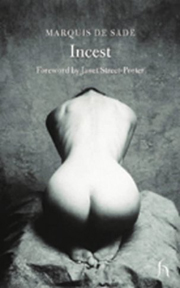
The Marquis de Who? It's actually Marquis de Sade. Yes, Sade. And yes, that's where the word 'sadistic' comes from.
So this is a famous, nay, infamous writer, who lived a life just as decadent and debaucherous as the one's he penned.
Is he worth reading? Depends. Should you read Hitler's Mein Kampf? I've read some of Mein Kampf, and found some of it interesting. You are, after all, having a direct conversation with The World's Biggest Asshole, and it's good to be able to recognise The Asshole Trying To Make A Sensible Argument. And I did find it frightening that, obviously at the time, Hitler was a guy that made sense to a lot of people. He spoke and people agreed with him. He had ideas about people, and they obviously had catastrophic consequences. So it's important to see where he first learned his theories, and where he found his supporting evidence. Philosophy is what underpins all powerful people. They have an idea, and they dedicate their lives to experimenting with it.
So it is interesting to read his thoughts and see where they start becoming scrambled eggs. But you have to be aware that in the process of watching the scrambled eggs being made, you might want to eat some too.
The same with this guy. I haven't read Sade, but I'm not sure what the point is (of reading about his philosophy when most of it is counterintuitive), and whether it is a point worth exploring in any detail.
If you want to be entertained, steer clear of this stuff. If you're trying to stretch your philosphical, and perhaps pyschological acumen, you might want to try to touch this stuff. Personally, I feel it's a bit like exposing yourself to smut, and then being asked to call it art. Art is art, and most of us know what is our own definition of going too far.
Some people use art as a license to allow everything.
It may be good to leave censorship to individuals, and this is certainly a case where you've got to make a decision. You've got to say, "I don't need to know this." Or you can linger in the murky world Sade makes. Morbid fascination?
I personally haven't read any of it. I might try it if someone makes a personal recommendation that makes sense to me.
The Marquis does make one interesting point. In Justine, Sade's most famous work he takes a virtuous woman and puts her through vile treatment, rewarding her virtue with suffering. This is a theme which unfortunately resonates in the way the world vilifies virtue today (remember how Senator's Kerry's heroics in Vietnam were instead turned into cowardice), and encourages corruption, the worship of wealth and beauty, but not truth.
Sade's philosophy is simply this: unleash the beast that lies within all human beings.
He believes that goodness leads, finally, to ill consequences and is punished with vice. There is some truth in that. Some well meaning people become victims, or fatally dependent on substances or slaves to their lovers.
But of course, that's not a whole truth. There are plenty of people who don't entertain even a fraction of their fantasies, and yet lives of calm satisfaction.
To believe in the beast within ourselves, and to inspire it in others, is to feed the evil of fiends, devils and put out the light shining through our own lives.
From http://www.kirjasto.sci.fi/desade.htm:
The most infamous writer in the history of French literature, who occasionally has been hailed as "the freest spirit who has ever existed." Marquis de Sade published erotic writings, that gave rise to the term sadism - enjoyment of cruelty, which first made it into a dictionary in 1834. His works have been seen as exploration of sexual and political freedom, and on the other hand he was a multiple rapist, torturer, and proto-murderer. In his 'Idées sur les romans' (1800) de Sade writes that the essence of novelistic representation lies in the writer's incestuous relationship with nature. To be true to this relationship is to eschew all limitations, and exceed the bounds of convention and knowledge.
"But if there seems little reason for literary people to concern themselves with Sade, he has found a new lease of life among philosophers and anthropologists. Bored and uneasy with our little lives we resort to the greater amplitude of symbols. Bardot, Byron, Hitler, Hemingway, Monroe, Sade: we do not require our heroes to be subtle, just to be big. Then we can depend on someone to make them subtle." (D.J. Enright in 'The Marquis and the Madame', in Conspirators and Poets, 1966)
Here's a review from the book pictured above:
Incest
Prepared by Shiva Rodriguez
The disturbing story of a libertine aristocrat who decides that his daughter should be completely removed from all the moral scruples and regulations of polite society. As a manner of achieving the ultimate liberation, he takes her as his lover. The secret is revealed when the daughter rejects the advances of her suitor and voices her preference to remain in her father's care, thus raising the suspicions of her pious mother.
Hailed as being one of Sade's most well-executed works, Incest heavily capitalizes on dismissing the "happily ever after" fairy tales and plunging deep into the hard, cold realities of consequence.

No comments:
Post a Comment